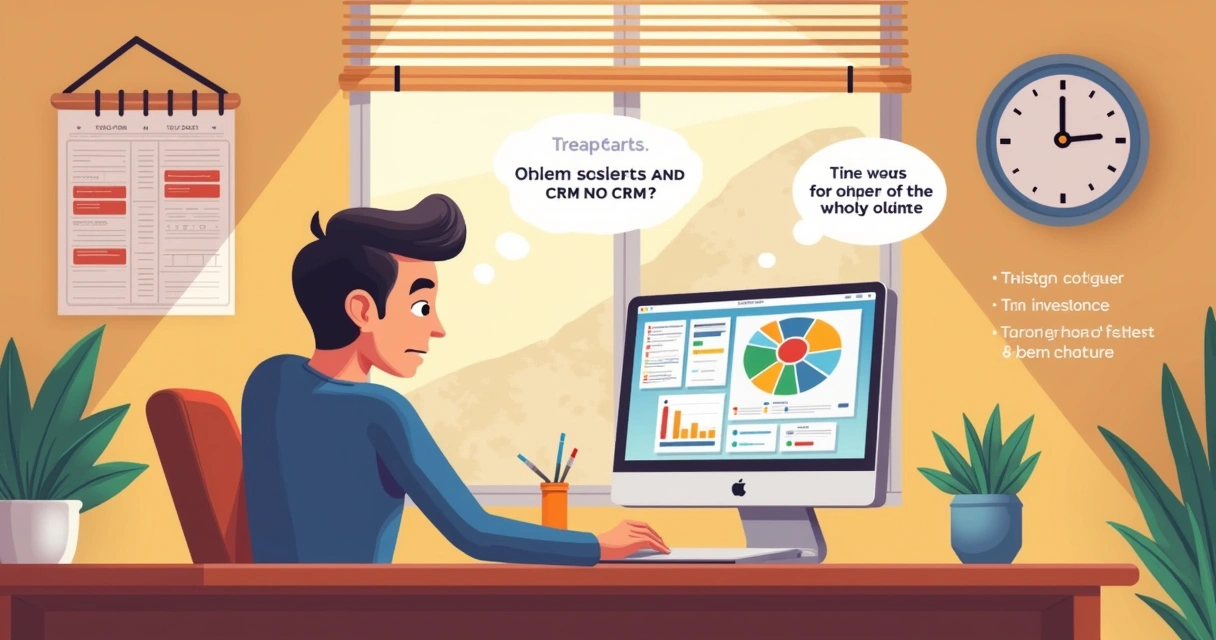Understanding the Importance of Adapting to a New CRM
Switching to a new customer relationship management (CRM) system may seem tricky, but it can really change the way you work for the better. Think about how much time you spend sifting through emails and notes. Now imagine if all that information was organized and accessible in one place. Wouldn’t that be a game changer?
Many people feel nervous about learning new software. The idea of adding more to your to-do list can be overwhelming. But with a good CRM, you’ll actually save time in the long run. For example, instead of manually tracking client interactions, the system can do it for you. This not only helps you stay on top of tasks but also boosts your client relationships.
Adapting to a new tool means embracing better options. Soon, you’ll see improved visibility into your client base and make smarter decisions quickly. Remember, every step you take toward using a CRM is an investment in your efficiency and growth. Embrace the change, and watch your workflow become smoother and more productive!
 Common Objections to Learning a New Software
Common Objections to Learning a New Software
When thinking about adopting a new CRM system, it’s normal to have some doubts. You might find yourself wondering if you can actually learn to use the software or if it will fit into your busy schedule. Let’s break down these concerns to help you move forward with confidence.
One big concern is the **fear of complexity**. Many people worry that a new system will be hard to use. The thing to remember is that today’s CRMs are often designed to be user-friendly. For example, they may include video tutorials or step-by-step guides that make the learning process easier.
An equally common fear is the **time commitment**. You might think that learning something new will take too long. However, investing a little time now can pay off later. A CRM can help you save hours each week by streamlining your tasks. Just imagine having all your client information organized in one place!
Some people resist change because they feel comfortable with their current method. It’s easy to stick with what you know, even if it’s not ideal. But consider this: what if a new system could help you manage your workload better and improve your client relationships?
Here are a few common objections to keep in mind:
- Fear of complexity: Will it be too hard to learn?
- Time investment: Is it worth the time to learn something new?
- Discomfort with change: Am I ready to switch from my current system?
Addressing these concerns can help you see the benefits of a new CRM. The right tool can make your work life a lot easier!
The Benefits of Choosing Atlas CRM
When it comes to running your business, choosing the right CRM can make a huge difference. Think of it as your personal assistant, helping you manage everything more efficiently and keeping your client relationships strong. Here are some key benefits you should consider:
- Better Organization: A solid CRM stores all client information in one place. You won’t have to sift through emails or documents to find what you need, making your life a lot easier.
- Stronger Client Connections: With a detailed view of each client’s history, you can personalize your communications. For instance, remembering a client’s birthday or preferences shows that you care.
- Time Savings: Automating tasks like follow-ups means you can spend more time focusing on what truly matters—building relationships and growing your business.
- Insightful Data: The right CRM helps you analyze trends. You can quickly see what’s working and what’s not, allowing you to make better decisions for the future.
- Easy Integration: Many CRM systems work well with tools you already use, like email and calendars. This means you won’t have to change your entire workflow to get started.
Investing in a great CRM is more than just getting a new tool; it’s about transforming how you manage your time and relationships. Instead of feeling overwhelmed, you can enjoy a more organized and productive workflow. So, don’t wait any longer—take the leap! You’ll find that the right CRM can truly enhance your business experience.
 Tips for a Smooth Transition to Atlas CRM
Tips for a Smooth Transition to Atlas CRM
Switching to a new CRM like Atlas CRM can feel overwhelming, but it doesn’t have to be. With a few simple tips, you can make this transition smoother and even enjoyable. Think of it as a journey where you learn new ways to manage your client relationships more effectively.
First, take advantage of the built-in tutorials. They’re there to help you learn step by step. Watching a short video is often more helpful than reading lengthy manuals. You might find it easier to grasp concepts this way. Just imagine how much easier life becomes when you understand how to navigate your tools!
Second, remember to use the support channels available. Whether you have quick questions or need in-depth assistance, reaching out for help can save you a lot of time. Knowing that expert help is just a message away can be reassuring, right?
Another smart approach is to take it one feature at a time. It’s like eating a slice of cake instead of trying to gobble it all at once! Focus first on contact management, then switch to deal tracking once you’re comfortable. This method makes learning more manageable and builds your confidence.
Here are some tips to help you transition:
- Utilize tutorials: Make the most of visual aids.
- Reach out for support: Don’t hesitate to ask questions!
- Take it slow: Learn one feature at a time.
Don’t rush the learning process. Each day with Atlas CRM brings new skills, making your work life easier. Embrace the change, and soon you’ll wonder how you ever managed without it!
Incorporating Atlas CRM into Your Workflow
Integrating Atlas CRM into your daily routine can significantly change how you handle client relationships. Imagine having all your client information stored in one place instead of scattered across emails, notes, and messages. With Atlas CRM, everything is neatly organized, making it easy to find what you need anytime.
One of the best features is the integration with tools you likely already use, like Google and Outlook. This means you can sync your calendar and emails directly with Atlas CRM. Picture starting your day and logging in to see a clear list of appointments and client touchpoints ready for you. This simplicity saves time and reduces stress.
As you grow comfortable with the platform, take advantage of features like tagging and segmenting clients. By categorizing clients based on their interests or engagement levels, you can tailor your communications. For example, you can easily follow up with potential leads or reach out to your most important clients without losing track. This kind of organization makes your job much more efficient.
It’s also a good idea to regularly check your sales pipeline. Keeping an eye on deal progress helps you spot any delays and automate reminders for follow-ups. Imagine effortlessly tracking your deals and prioritizing your daily tasks; it feels good to have a streamlined process!
Don’t forget to explore the support and tutorials that Atlas CRM offers. They are designed to help you make the most of the platform. By embracing these features, you’ll find that Atlas CRM fits seamlessly into your workflow, allowing you to spend more time focusing on what matters most—your clients.
The Long-Term Benefits of Using Atlas CRM
Adopting Atlas CRM can really change the way you manage your business. At first, the idea of using a new tool might feel overwhelming, but the truth is that it helps simplify many tasks, making your daily life easier. Instead of spending hours on repetitive work, you’ll have more time to connect with clients and focus on growing your business.
One of the best benefits is the boost in efficiency. With all your client information in one place, you won’t waste time hunting for emails or notes. Everything you need is organized and easy to find. Just think of the time you could save each week and how you could use those hours for planning or meeting clients.
Another great outcome is improved client engagement. Atlas CRM allows you to track all interactions with each client, giving you insights into their preferences and needs. This means you can tailor your approach, remembering important details that make clients feel valued and understood.
Here are some long-term advantages you can expect:
- Streamlined processes: Automate routine tasks so you can focus on what really matters.
- Stronger relationships: Keep detailed notes that help you connect better with clients.
- Data-driven insights: Use analytics to shape your strategies and improve decision-making.
- Smoother teamwork: Easily share important information with your colleagues.
Embracing Atlas CRM is not just about organizing data; it’s a smart investment in your success. The more you use it, the more you’ll see how it transforms your workflows and enhances your ability to manage client relationships.
Conclusion: Embracing Change for Better Client Management
Switching to a new CRM, like Atlas CRM, might seem a bit overwhelming at first, but it can truly make a difference. Think about how you manage your client relationships. With Atlas, you can keep track of everything that matters, like client preferences and past interactions, all in one place.
This system helps you stay organized, saving you time and reducing stress. For instance, instead of scrambling through emails to find important details, you’ll have instant access to what you need. A well-organized CRM means you can focus more on your clients and less on searching for information.
Imagine being able to respond quickly to client inquiries, which strengthens your bond with them. With tools designed specifically for independent consultants, managing your relationships becomes simpler and more effective. Embracing this change is a smart investment in your business. Remember, the more organized you are, the more time you can spend growing your business and serving your clients. Don’t hesitate—jump into life with Atlas CRM and see how it transforms your daily routine!







